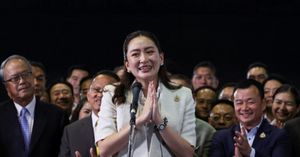Donald Trump has taken the oath of office for his second term with resounding fanfare and equally notable challenges. Polls indicate Trump's approval ratings hover around 47%, which aligns closely with his inaugural rating of 45% back in 2017. This statistic stands out as Trump uniquely remains the only elected president to commence both terms with sub-50% approval ratings, distinguishing him from his contemporaries like Joe Biden, who enjoyed approval ratings exceeding 50% at his inauguration.
Despite concerted efforts and promises made throughout his campaign, Trump's priorities upon entering his second term seem misaligned with the pressing concerns of many voters. Initially focused on lowering inflation and food prices, Trump has shifted his attention, stating, "I always felt the border was first…I talked about inflation, too, but you can only talk about it so long." This shift has raised eyebrows, especially among voters who originally supported him, anticipating immediate action on economic concerns.
Trump’s early days as president have been marked by controversial actions: he has expedited mass deportations, dismantled diversity programs within federal agencies, and pushed for dramatic shifts of power toward the executive branch. According to William Galston, former deputy assistant for domestic policy to President Bill Clinton, this barrage of rapid policy changes is intended to overwhelm opposition and create confusion among dissenters. "This is deliberate strategy. Shock and awe. You try to do so much at once...it makes it impossible to unite against these moves," he noted.
Meanwhile, as Trump moves to remake the federal government, his relationship with billionaires like Elon Musk has become increasingly pronounced. The changes implemented under Trump’s administration reflect significant input from Musk, who reportedly directed $250 million toward Trump's reelection campaign and has placed several loyalists within key government positions. This blending of populism and elitism is puzzling and somewhat unprecedented; working-class voters, traditionally aligned against the wealthiest segments of society, have found common ground with these billionaires, creating new political dynamics.
While the concept of wealth and class historically operating against each other is ingrained within American political narratives, Trump's coalition of supporters has altered perceptions significantly. Through the 2024 election, Trump garnered substantial support among those earning less than $50,000 annually, showcasing how class lines may be shifting under his populist appeal, even as he engages closely with affluent backers.
The initial moves of the Trump administration have sparked considerable debate. His strategy to reshape the government through aggressive executive orders, including the mass resignation requests from civil servants, drew severe criticism. Activist groups warn this transition erodes historical protections, potentially devolving toward a system lacking accountability. "This offer should not be viewed as voluntary...the intent appears to create a toxic work environment for federal employees," stated Everett Kelley, president of their largest union.
Concurrently, Trump's controversial proclamations — particularly concerning immigration and socioeconomic entitlements — threaten to expand divisions among his own support base. He remarked at various events, "I won on the border, and I won on groceries…we're going to bring those prices way down," but appears to prioritize other agendas over alleviating inflation or economic recovery.
His sweeping changes have raised questions about his ability to maintain support. The dramatic pivot toward cultural issues and critiques of diversity and inclusion initiatives may disillusion the voters who crossed party lines to support him, as they hoped for tangible economic fixes from his administration. The nuances of these changes are still unraveling, but it's clear Trump's early second term reflects both high ambitions and precarious footing. Can he sustain this momentum, or will resistance develop as his policies manifest? Only time will reveal the path forward.
The future remains uncertain as Trump navigates the risks associated with his rapid governance style. Observers caution about potential backlash, especially from swing voters whose dissatisfaction with economic conditions could fuel significant electoral repercussions. If overreach occurs, it may lead to substantial shifts during upcoming elections, foretelling potential challenges to his agenda.



